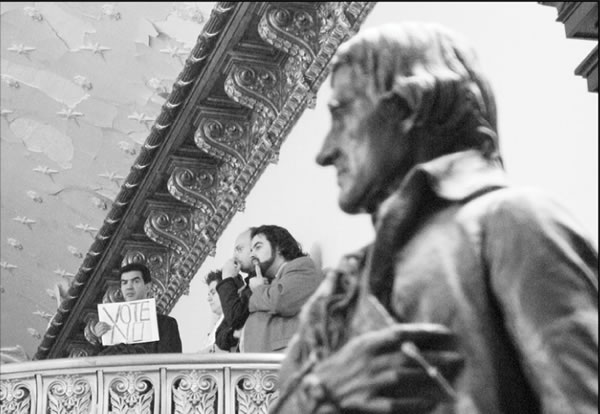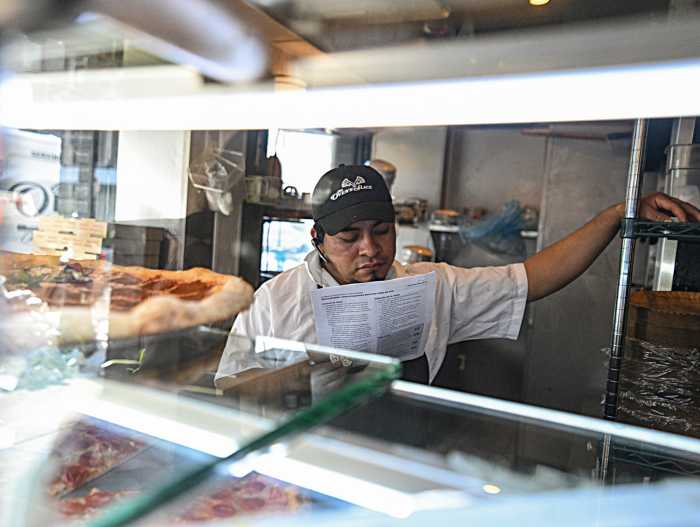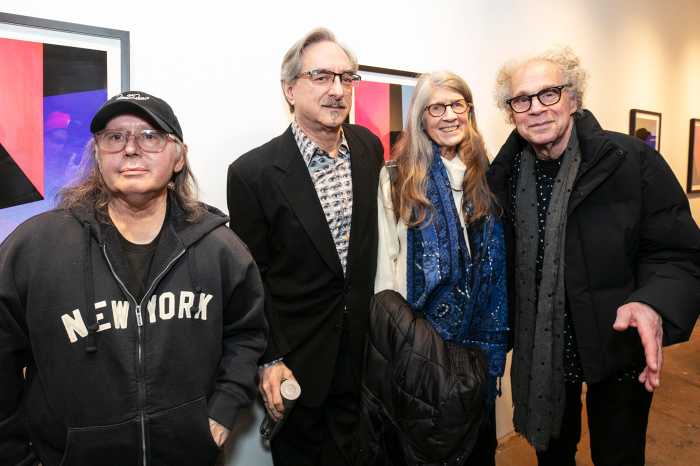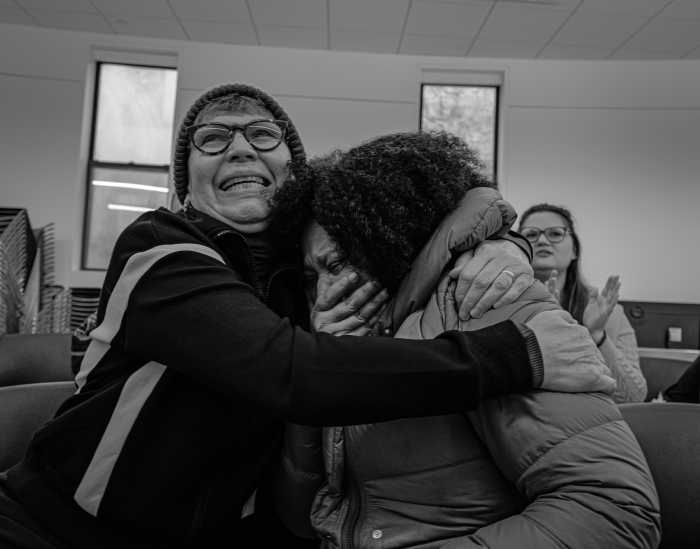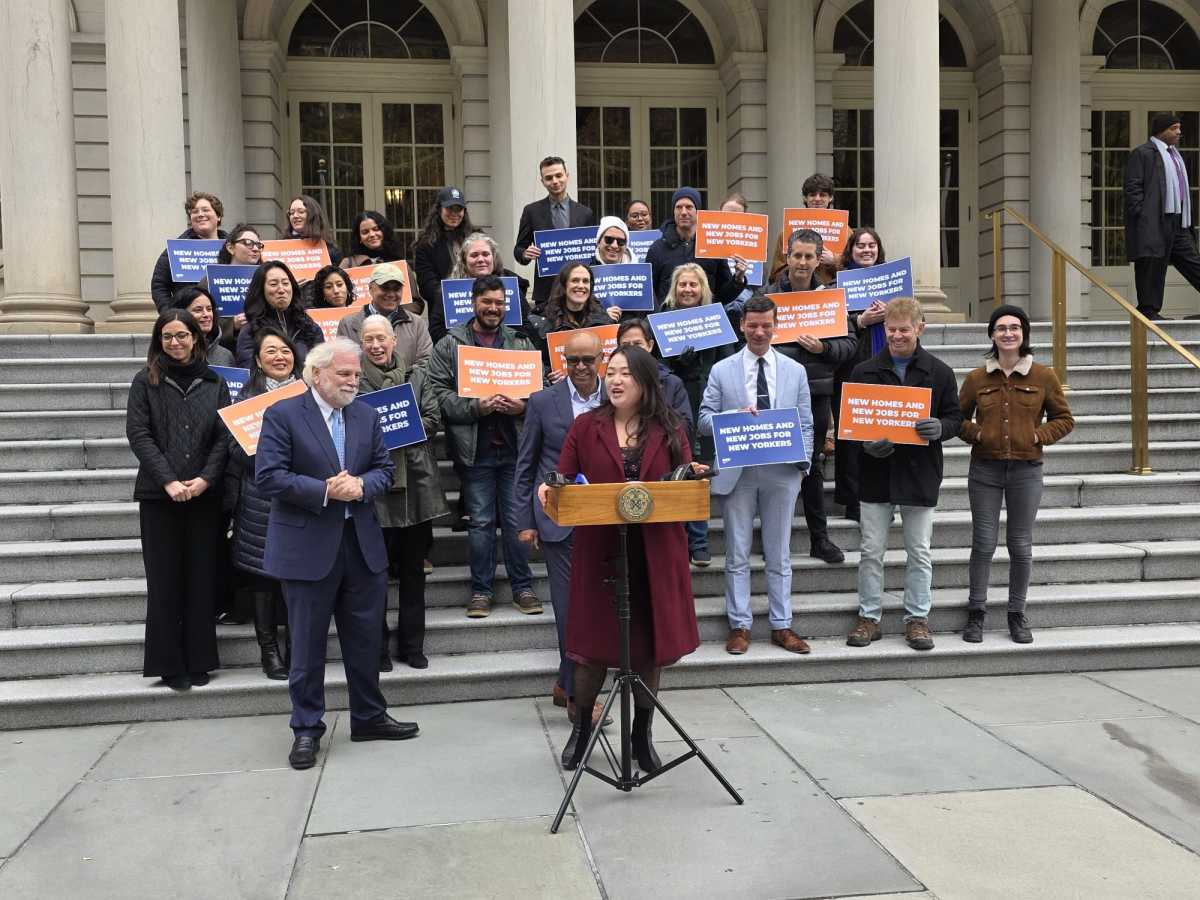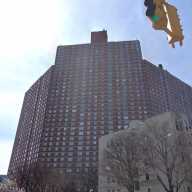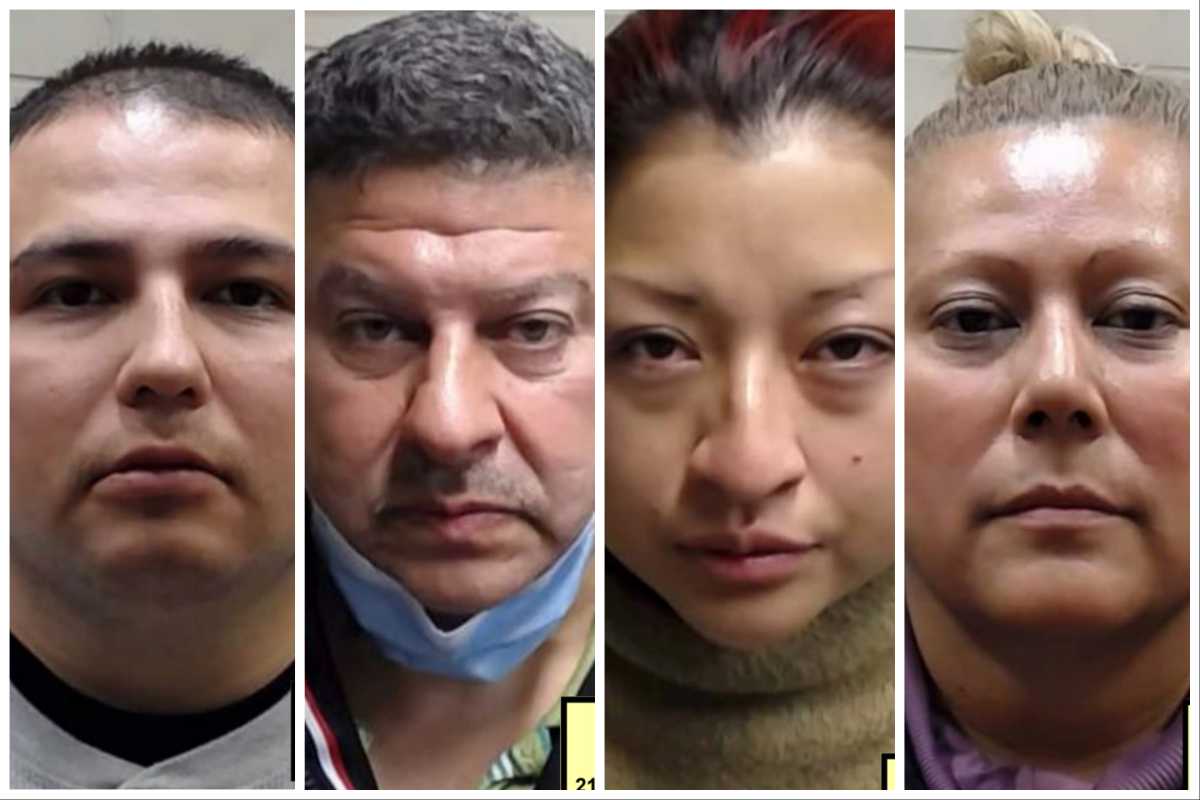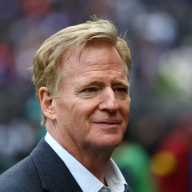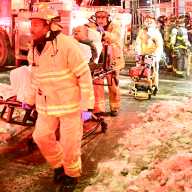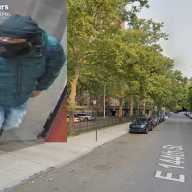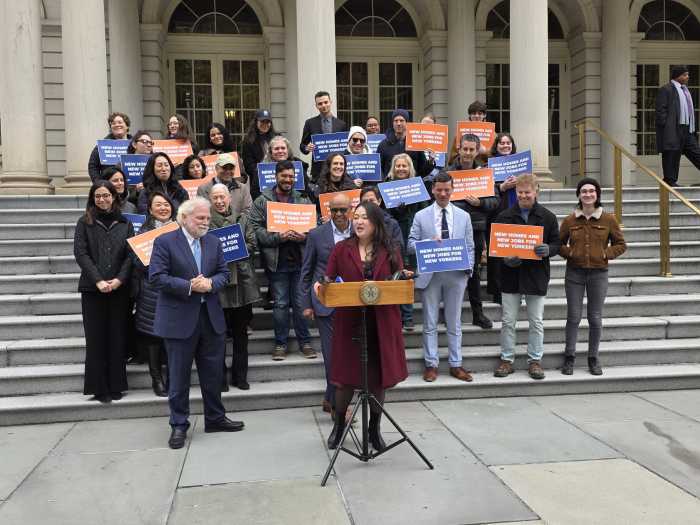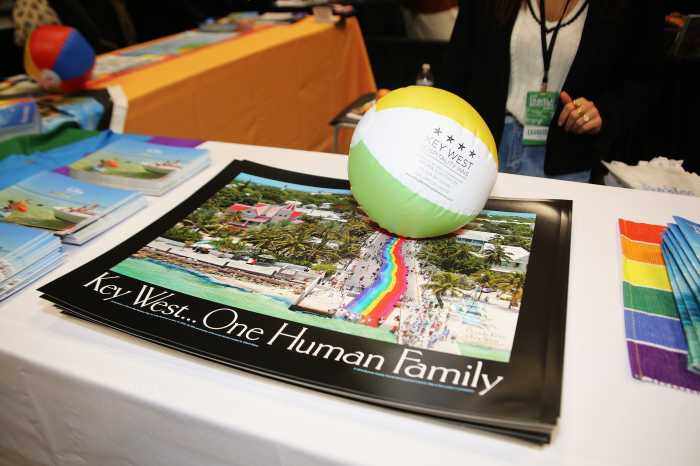By Lincoln Anderson
After the City Council voted last month to extend term limits to three terms, Council Speaker Christine Quinn was serenaded with a chorus of jeers from spectators in the Council Chamber balcony: “Sell out!”…“Quinn, you sold out the city!”
The speaker, as a veteran politician, surely shrugged off those barbs. But will she be able to do the same with potential challengers vying against her for her Village/Chelsea district seat next year — challengers who would surely use the term limits controversy as a campaign issue?
Following the council’s divisive, narrow vote that saw it legislatively undo two public referenda on term limits, at least two candidates — Maria Passannante Derr and Yetta Kurland — said they still plan to run against Quinn in next year’s election.
Two others who had been expected to run for the Council District 3 seat should term limits have been upheld, forcing Quinn out of office, are Andrew Berman and Brad Hoylman. Berman wouldn’t say if he’s planning to run. Hoylman said he definitely would not run against Quinn.
On Nov. 3, the mayor signed into law the bill extending term limits.
“This vote was a sad day for democracy, and the city councilmembers who voted for it should be held responsible,” Derr, a former Community Board 2 chairperson, said in a statement after the council’s Oct. 23 vote. “There was no respect for the democratic process of the two referendums in ’93 and ’96 or for the will of the people.
“People have encouraged me to continue with my candidacy,” Derr said. “They are disappointed with Speaker Quinn — that she is no longer the voice of the community. They tell me that we need new leadership in this community because Quinn is enabling the Republicans to control this city for 20 years.”
After the City Council’s vote, Kurland, a civil rights attorney, said in statement: “This certainly sends a chilling message to all of us about what the future could hold if we do not stand up to those intent on putting self-interest before democracy. No elected official is indispensable. Rather, it is the process of democracy that is indispensable.
“I have been running a campaign for City Council for the last six months and I intend to continue,” Kurland said. “I will not be dissuaded by the mayor’s efforts to tell us that our votes don’t count. I look forward to the opportunity to restore the voice of the people to our local government.”
Berman, executive director of the Greenwich Village Society for Historic Preservation, told The Villager: “I think it was a pretty sad day for democracy in New York City. I think that going around the voters, rather than trying to convince the voters to change the term limits law, is really an insult to the citizens of New York City.”
Berman stressed he was “speaking as a citizen of New York City,” not in his capacity as G.V.S.H.P. director.
Queried if he plans to run for Quinn’s seat in ’09, assuming she is no longer term-limited, Berman told The Villager, “I’m reviewing all my options. But you’ll be the first to know.”
Asked how he felt the whole affair left Quinn looking, Berman declined to criticize the speaker directly, but reiterated, “I think it tarnished the image of our democratic institution in New York City, and I think it made a lot of people feel very cynical about their government.”
Hoylman, C.B. 2’s current chairperson and a close political ally of Quinn, at first was evasive on whether he condemned or supported term limits being legislatively overturned — not to mention whether he would take on Quinn if she runs for re-election.
“I can’t talk right now, I’m in my office. I’m at work,” Hoylman said hurriedly when a reporter called the day after the council’s vote.
The following week, Hoylman responded to e-mailed questions from The Villager by saying, “I don’t have any comment. … I’m up to my ears at work.”
This week, asked again for his opinion, Hoylman replied in an e-mail:
“The people I’ve talked to have a problem with the process — not so much the outcome — of the term limits debate,” he said. “But as a potential 2009 candidate who would have benefited under the (now) old two-term limit, it would be hypocritical for me to criticize the council on the grounds of acting in their own self-interest.
“However, as someone who is strongly opposed to term limits in principle, I do wish this issue would have been reviewed thoroughly by a charter revision commission months ago and brought to a public vote. I suppose all of us who care about this issue should have anticipated what happened and pressed the mayor to convene a charter commission when there was still time. But that’s Monday morning quarterbacking, I suppose,” Hoylman said. “This time, we need to plan ahead and start thinking about what changes we want to see from the upcoming charter commission.”
As for whether he would challenge Quinn for her seat next year, assuming the term limits extension is upheld in the face of court challenges, Hoylman said: “Speaker Quinn is one of the most qualified, effective and dynamic elected officials this city has and I’ll be supporting her for re-election.”
Meanwhile, Councilmember Alan Gerson defended his vote to extend term limits. Gerson, along with Councilmembers David Yassky and Gale Brewer, had first pushed an amendment to the bill requiring a voter referendum. After the amendment failed, Gerson and Yassky backed extending term limits legislatively, while Brewer held firm, voting against the mayor’s bill.
Defending his decision afterward, Gerson said: “I’m disappointed that the amendment didn’t pass… . But it failed by a narrow margin.” He said he backed extending term limits because it involved “the same basic principles and reasoning that led me to support a referendum — because it gives maximum choice and democracy to the voters.”
“I heard loud and clear from voters in my district that they wanted a referendum,” Gerson said. “But I also heard from a significant number of voters that they wanted the choice to vote for the mayor and others. We’re only at the tip of an unprecedented economic crisis… . Many New Yorkers inside and outside my district want a choice; they want a choice under changed circumstances.”
He took a small degree of satisfaction in noting that his amendment, which failed by a vote of 22 yes, 28 no and 1 abstention, actually did slightly better than the opposition to the mayor’s bill to extend term limits, which passed by 29 yes to 22 no.
A few days later, Gerson told The Villager that extending term limits — rather than being an end run around the voters — really just means “more meaningful democracy.”
However, Kurland disagreed. She predicted that significantly fewer candidates will choose to run next year if incumbents who would have been term-limited — including the mayor, four of five borough presidents and more than 30 councilmembers, including Quinn — are allowed to run for re-election.
Councilmember Bill de Blasio — a plaintiff in a lawsuit against overturning term limits — when asked his views on Gerson’s first supporting a voter referendum, then backing extending term limits, recalled the 2004 presidential race.
“It’s like John Kerry,” de Blasio said. “You can’t say you were against it before you were for it — flip-flop.”
Gerson denied any self-interest in voting to allow himself to run for re-election, saying he would have run for borough president if he was term-limited. But then he added he would never run against Borough President Scott Stringer, who — though he had been mulling a run for public advocate — subsequently announced last week that he is running for re-election for B.P., which he could have always done because he wasn’t facing term limits.
Councilmember Rosie Mendez, for her part, staunchly opposed extending term limits without voters’ input. Opponents of holding a referendum on short notice had argued it would cost the city up to $15 million. But Mendez dismissed that figure as irrelevant.
Addressing the full City Council on Oct. 23 before its vote on the Gerson-Yassky-Brewer amendment, Mendez said: “A referendum — $15 million. Council hearings on this bill — many hours. Democracy — priceless. … You can’t put a price on democracy. It doesn’t matter if it costs $5 million, $15 million or $15 billion — the people have a right to vote.”
Shortly afterward, before the councilmembers voted on the bill to extend term limits, Mendez cited The Villager. Quinn, in her opening remarks, arguing that support for longer terms was wide-ranging, had mentioned a consensus among daily newspaper editorial boards: “We see The New York Times, the Post and Daily News and the Staten Island Advance agree on it,” the speaker said, noting these papers “rarely agree” on issues.
“There’s been a lot of talk about major papers backing this bill,” Mendez said, addressing Quinn and her fellow councilmembers. “Looking to the local papers — and the paper that has the pulse of my community — The Villager newspaper said we should have a voter referendum. El Diario said we should have a voter referendum,” Mendez added. She also noted that letters to the editor in The Villager up to that point on the issue had favored a voter referendum.
As opposed to Gerson, who said residents in his Lower Manhattan district strongly wanted a “choice” to re-elect the mayor, Mendez said constituents in her East Village-based district felt holding a popular vote first on the issue took precedence.
“My constituents overwhelmingly wanted a referendum,” she said, noting “98 percent to 99 percent” of residents’ phone calls and e-mails to her office supported term limits being extended by the citizens only.
“Even my constituents who wanted to vote for Bloomberg wanted to do a referendum first,” Mendez said.
Without the legislation change, Gerson, who is in his second four-year term, would be forced out of office at the end of next year. Mendez, on the other hand, is in her first term and wasn’t facing term limits.
Dan Garodnick, who represents Stuyvesant Town and Peter Cooper Village and who is also in his first term in the council, without fanfare, quietly voted for the amendment and against the mayor’s bill.
Former Parks Commissioner Henry Stern said the reason term limits can be changed by the mayor and council is because, after the voter referenda passed in the 1990s, the City Charter wasn’t modified to specify that term limits is something that can’t be legislatively changed. When a charter revision commission eventually takes up the matter, “that loophole needs to be closed,” Stern said.
Before the mayor signed the bill extending term limits on Nov. 3, he sat listening to four hours of public testimony. Proponents and opponents of the East Village/Lower East Side rezoning both made comments in their allotted two minutes of speaking time. For once, they were in agreement.
Michael Rosen, a member of the East Village Community Coalition and a rezoning supporter, urged the mayor to remember how, just a few decades ago, people were brutally murdered fighting for the right of American blacks to vote in the South.
Miha Nakasaki, of the Coalition to Protect the Chinatown and the Lower East Side, a group critical of the rezoning plan, told the mayor, “This bill is part of your agenda to rezone New York for the wealthy. We’re really tired of it, and we cannot stand another year of you in office.”
In addition, state legislators are filing a bill that would block the mayor and City Council from extending term limits. Local Assemblymember Deborah Glick is a co-sponsor. The bill would mandate that New York State municipalities that have term limits that were passed by referendum can only legally change them through a referendum.
Of Bloomberg, Glick said, “He’d rather have the electorate be 51 people [the City Council] than over 1 million people. He wants people to have faith in him, yet he’s not showing faith in the people.” As for Quinn, Glick said, “Her electorate is 51 people.”



